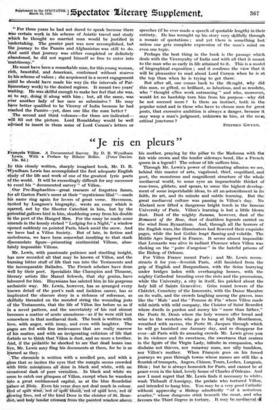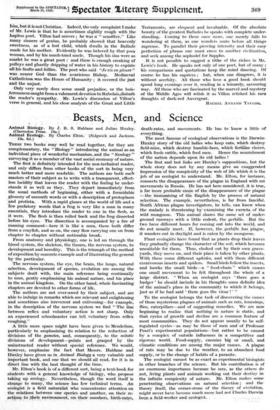Je ris en pears
CC Lewis. With a Preface by Hilaire Bellee. (Peter Davies.
,potential gallows bird in him, shuddering away from his double in the poet of the Hanged Men. For the essay he made some we have had a Villon Society. But of late, in fiction and Wyndham Lewis has accomplished the first adequate English opened suddenly on pointed Paris, black amid the snow. And disconsolate figure—presenting sentimental Villons, abso- hitely impossible Villons.
of the world. It will be exceedingly difficult for any successor to excel his " documented, survey " of Villon.
12s. 6d.) - Our Pre-Raphaelites—great rescuers of forgotten fames, Mr. Lewis, with passionate patience and startling insight, the Bishop of Orleans.
has now recorded all that may be 'known of Villon, and the For Villon France meant Paris ; and Mr. Lewis recon- structs it for you—feverish Paris, still faniished from the burning bitter stuff of life that ran into the Testaments and
implicated the obscure story in a richness of reference, so on its walls, and the crowds laughing among the graves, inns like the ' Mule ' and the Pornme de Pin ' where Villon made skilfully threaded on the mended string the wounding jests of the Testaments, that the life of Villon lies before us as if wild mirth with wild company, the Cloister of Saint Benedict m a novel pattern, and the uncertainty 'of his end almost where dwells in pardon and mercy his "more than father," becomes a matter of acute uneasinessai if he were still lost the Porte St. Denis where the holy women 'offer bread and semewhere in that mediaeval dusk. The book is written with wine to the wretches who go to hang at high Montfaucon, wreathed' with' ravens; the Porte' St. Jacques through which love, with anger, with irony, and even with laughter. The he will go banished one January day, and so disappear for pages are fed with fine irrelevances that are really marrow ever—all Paris with its amazing crowds Mr. Lewis gives you of his matter, and with an invigorating criticism of life that
in its violence and its sweetness, the sweetness that centres forbids us to think that .Villon is dust, and no more a brother. in the figtire of the Virgin Lady, .i.nfinite in compassion, who And, if the P&Iantic be shocked to:see that deal bones 'can
disdains not thieves, nor runaway nuns, nor silly tumbler% kye, Mr. Lewis may fling his documents at them, for he is as nor Villon's mother. When FranCois goes on 'his force& learned as they. The chronicle is written with a needled pen, and with a journeys we pass thiMigh towns whose names are still like a flourish of trumpets, Angers, Chinon, Tours, Loches, Langeais, gloss that so 'incites the eyes that the margin seems crowded With little miniatures all dOne in. black and, white, with an Blois ; but he is always homesick for Feria, and cannot be at peaCe even in the kind, loVelY house of Charles &Orleans. And occasional dash of pure verMilicin.. in black and white we
now I must regret that Mr. Lewis finds it necessary to white: seem to catch our glimpses of Villon, except when he wanders into a great emblazoned capital, as at the blue fieurdelise wash Thibault d'Aussigny, the prelate who tortured Villon, and intended to hang him. You may be a very good Catholic *dace at Blois. Even his verse_ does not deal much in colour. {led of spilt Wine, 'red nf'spittl bioa,'sied 'nf siiilt-lOVe;--red of Withmit apirrovffig Rishori admittedly ek or a -notorioua, glowing fires, red of the kind Door in the cloister of St. Bene- favours the Third Degree in torture.-.- bp.mecl*py.14-511 dieteirird holy tender crinissal from-the-painted window above
for all Gaston Paris's sneer at their " mysticisme lilial "—made his name ring again for lovers of great verse. Stevenson, incited by Longnon's biography, wrote an essay which is marred, not by the Shorter Catechist in him, but by the amends in the keenly etched " Lodging for a Night," a window melodrama, we have been -somewhat insulting to that stark Francois Villon. A DoCumented Survey. By D. B. Wyndham his mother, praying by the pillar to the Madonna with the study of the life and work of one of the greatest lyric poets IN this closely written, sharply imagined book, Mr. D. B.
pages, while the last Gothic leapt flaming and volatile. The Middle Ages lingered in France. It seems almost impossible that Leonardo was alive in radiant Florence when Villon was the wind from Byzantium. And, through all the horrors of. the English wars, the illuminators had flowered their exquisite choking on the " poire d'angoisse " in the hateful prisons of, Remount of the Rose, dust of deathless legends carried on, dust. Dust of the mighty Summa, however, dust of the fair wide crown and the tender sideways bend, like a French queen in a legend! The colour of life suffices him. behind this master of arts, vagabond, thief, coquillard, an& great Mediaeval culture was passing in- Villon's day. No rose-trees, gibbets; and spears, to, 'some the highest develop- , ment of some imperishable ideas, to, all an astonishment in its Abelard now lifted a dangerous bright torch in the famoua University of Paris. Villon's learning is but a little blown poet, the monstrous and magnificent structure of the whole faith, its art, and its minute and subtle learning. But the mediaeval world, to some eyes an impenetrable thicket of
Thiough Mr. Lewis's power of illuminating allusion we see, the incomparable Ballades. The French scholars have done grip of English and Burgundians, with the Seine hurrying Well by their poet. Specialists like Champion and Thuasne, under bridges laden with overhanging houses, - with the mighty Cathedral brooding over the riots and the processions, literary artists like Marcel Schwob, that shy genius, have avarice," whose dungeons stink beneath the moat, and whir,
him, but it is not Christian. Indeed, the only complaint I make of Mr. Lewis is that he is sometimes slightly rough with the hapless poet. Villon had nerves ; he ivaa " sensitive." Like many sinners of genius, he probably showed that heavenly sweetness, as of a lost child, which dwells in the Ballade made for his mother. Evidently he was beloved by, that poor woman, and by his much-tried uncle. Though his sins were as scarlet he was a great poet : and tliere isl enough creaking of pulleys and ghastly dripping of water in his history to expiate all his faults and follies. The poet who said "Je-ris en pleurs'? was -nearer God than: the avarieious Bishop. Mediaeval Catholicism: was the-House of Humanity ; it covered the just and the unjust.
Only very rarely does some small prejudice, or the bois- terousness caught from a vehementdevotion to Rabelais,disturb the reader's sympathy. Mr. Lewis's discussion of Villon's verse in general, and his close analysis of the Great and Little
Testaments, are eloquent and invaluable. Of the absolute beauty of the greatest Ballades he speaks with complete under- standing.- Coming to these once more, one merely falls to wondering at them, as one wonders mute before all things supreme. To parallel their piercing intensity and their easy perfection of phrase one must cross to another civilization, and seek among the asphodel for Sappho.
It is not possible to suggest a- tithe of the riches in Mr. Lewis's book. He speaks not only of one poet, but of many ; his comparisons and quotations keep the-mind dancing. Of course he has his caprices ; but, when one, disagrees, it is without acerbity. All those who love a good book should spend long evenings over it, reading in a leisurely, savouring way. All those who are fascinated by the marvel and mystery -of the Middle Ages will relish it as Villon relished his rare draughts of dark-red Auvergnat.
RACHEL ANNAND TAYLOR.



























































 Previous page
Previous page